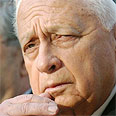
Sharon's era over
צילום: איי אף פי
Sharon era is over
PM's political career over, but Israel's democracy can handle it
It is unclear how Prime Minister Ariel Sharon will end this night, but one thing is clear: The era of Sharon's control over Israeli politics has drawn to its end, for better or for worse, at Jerusalem's Hadassah Ein Kerem hospital.
Following the prime minister's stroke, nothing will bring him back into the political game: Not the surging popularity, not the concern and aching heart of the public, and not even the waves of sympathy.
Even if Sharon is able to function, national responsibility will require him to retire from political life and withdraw his candidacy for the post of prime minister.
Israeli democracy is facing a difficult test tonight, but we are talking about a test it already overcame in the past. Under very different circumstances, a prime minister died in Israel while on the job, more than 10 years ago. He did not resign, he did not quit, and he did not lose the elections. The difference has to do with the extent of the public's trauma and pain, but the democratic tumult is largely the same.
The political game moved to a new phase only recently, an unknown phase. For the first time in many years, a new and significant player entered the political system: A large, powerful, popular centrist party. A party that changed the rules of the game only several months ago. Now, it's a whole new ballgame.
It is still too early to predict, guess, or attempt to analyze the next moves. In any case, it is clear that new things are in store. The political system without Ariel Sharon is an entirely different system, facing a mess for the time being, confused, and lacking a clear direction.
If the prime minister's presence made it unequivocally clear he is the person that will form the next government, now everything can change. The voters, Israel's citizens, will be facing difficult questions and numerous dilemmas. The same is true for the politicians and many glittering names only recently added to Kadima, Sharon's new party.
If up until now, Israeli citizens put their trust in Ariel Sharon, from now on everything will change. The pressure of terror attacks, the Qassam rockets, and tthe overall complex security situation will look completely different with different people heading the government and Kadima. Be it Ehud Olmert, Tzipi Livni, or even Shimon Peres, it is blatantly clear the public will treat them differently. Completely so.
Whoever is chosen to head Kadima will obviously promise to continue in "Sharon's footsteps. We are not talking about cynicism, but rather, about reality: Immediately after Sharon departure from the political life, those who aim to succeed him will attempt to attribute his way to themselves, and will pledge to follow it.
This has numerous implications, particularly on the diplomatic front. Sharon knew how to navigate "between the raindrops," and how to give everyone, on the Left and Right, the feeling he will follow one's favored path. Sharon made the center-rightists believe he will closely follow the Road Map for peace. Meanwhile, he gave the center-leftists the sense that setting the country's final-status borders was at the top of his agenda.
Whoever replaces Sharon, whoever heads Kadima, will have to attempt to follow in his footsteps and convey similar messages. However, as opposed to what we knew up until now, it will be much more difficult. The Israeli public trusted Sharon, but will not necessarily also believe Ehud Olmert or Tzipi Livni.
The other questions touch on Israel's other parties and remain just as open. We can assume the large parties, Labor, Likud, and possibly Shinui, will "enjoy" the new situation. Their voters, who left for Kadima, may now choose to return to their longtime political home.
One thing must be clear: Israel's democracy is able to cope with this challenge. Even if there's a sense that the person "who couldn't be replaced" is no longer fit, there are still plenty of worthy individuals. Many experienced politicians are waiting for the moment the prime minister's chair will become vacant, so they can compete for the post of Israel's prime minister










